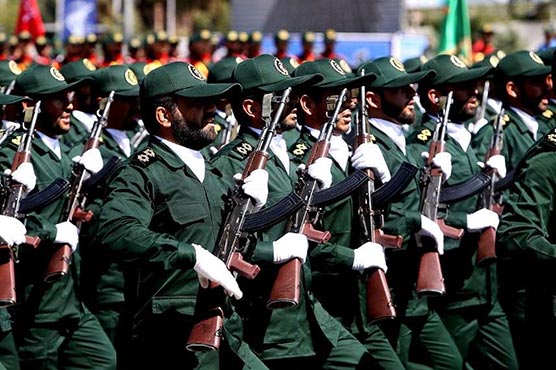US terror label for Iran Revolutionary Guard takes effect

The move adds a layer of sanctions to the elite military unit
WASHINGTON (AP) — The US terrorism label for Iran s Revolutionary Guard formally took effect on Monday, amid a battle between the Trump administration and some in Congress over waivers on oil and nuclear sanctions that are due to expire or be extended early next month.
The Guard s formal designation as a "foreign terrorist organization" — the first-ever for an entire division of another government — kicked in with a notice published in the Federal Register.
The move adds a layer of sanctions to the elite military unit and makes it a crime for anyone in or subject to US jurisdiction to provide it with material support. Depending on how broadly "material support" is interpreted, the designation may complicate U.S. diplomatic and military cooperation with certain third-country officials, notably in Iraq and Lebanon, who deal with the Guard.
President Donald Trump and Secretary of State Mike Pompeo announced the step with great fanfare last week, opening a one-week consultation period with Congress during which members could have raised objections.
Lawmakers were broadly supportive, but congressional Iran hawks are now expressing concern that the administration may extend waivers on oil and nuclear sanctions. Those sanctions, which are unrelated to the Guard designation, were imposed last November following Trump s withdrawal of the U.S. from the landmark 2015 Iran nuclear deal that May.
They target major elements of Iran s economy, notably its energy sector, by hitting foreign companies and governments with so-called "secondary sanctions" if they continue to do business with targeted Iranian entities. A main goal has been to dry up revenue from Iran s oil exports, which the U.S. says is the main driver of the country s funding of destabilizing activities throughout the Middle East and beyond.
In order not to shock oil markets with the sudden loss of Iranian crude, the administration granted several waivers that allowed some nations and Taiwan to continue their imports as long as they moved to reduce them to zero. Those waivers are due to expire in early May, and Iran hawks in Congress and elsewhere are urging the administration not to renew any of them. They say extending even some of the eight waivers would run counter to Trump and Pompeo s stated goal of keeping "maximum pressure" on Iran.
U.S. officials have been coy when asked about the waivers, leading to concern among hawks that some or all of them may be extended.
The administration s point man for Iran, Brian Hook, has said that three of the waivers won t need to be extended as those countries have eliminated all Iranian oil imports. But he has remained silent on the other five. Pompeo has similarly refused to comment on the possibility of extensions.
In testimony before the Senate Foreign Relations Committee last week, Pompeo was pressed by Sen. Ted Cruz, R-Texas, about whether the oil sanctions waivers, as well as waivers related to technical cooperation at Iranian nuclear facilities, would be extended. He suggested that some at the State Department were pushing for extensions.
"Let me urge you and urge the department unequivocally not to grant the nuclear waivers and not to grant the oil waivers," Cruz said, "I think maximum pressure should mean maximum pressure."
Pompeo demurred, but during a trip to South America over the weekend he bristled when asked if the Iran hawks had reason to be concerned.
"It s ludicrous," he told reporters accompanying him. "It s ludicrous. Look, people want to tell stories, people want to sell newspapers. I ve got it. Congressmen will grandstand, I ve got that too. The State Department s going to get it right. We understand our mission."
Cruz was not impressed. "The Senate Foreign Relations Committee needs to understand why some in the State Department think it s a good idea to keep enriching the Ayatollah with oil billions and to let Iran keep spinning centrifuges in a bunker that they dug into the side of a mountain so they could build nuclear weapons," he said in a statement released by his office.

